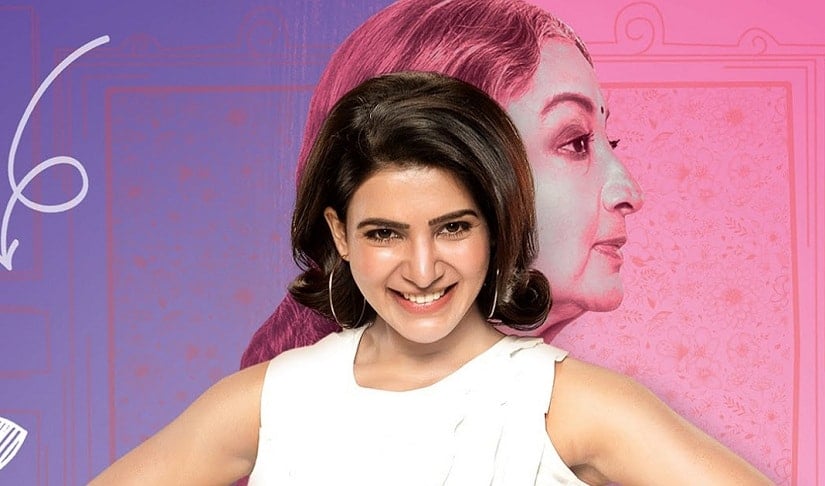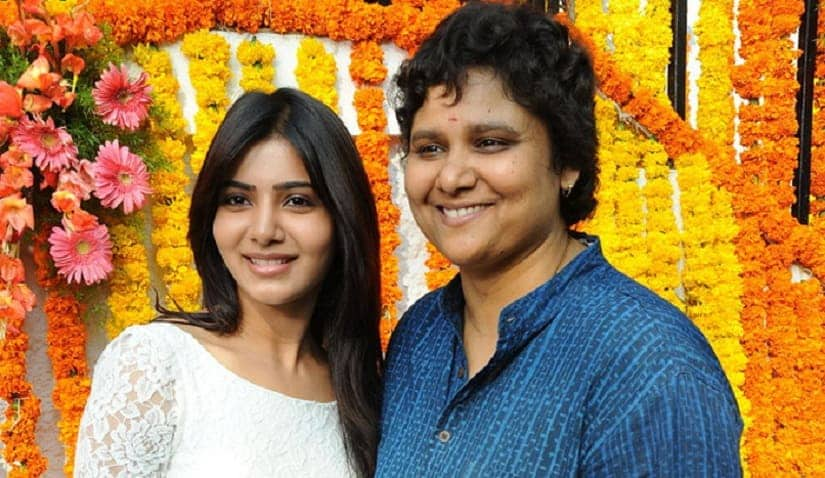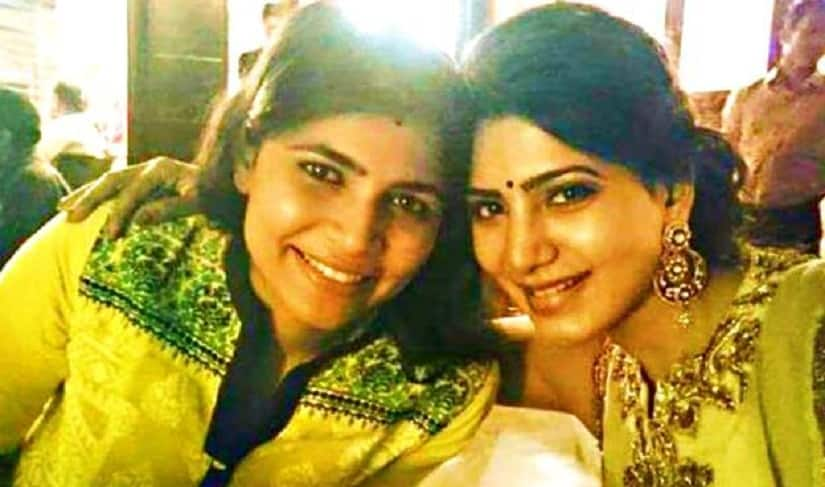Samantha starrer Oh! Baby, directed by Nandini Reddy, is the Telugu remake of a popular Korean film, Miss Granny which released in 2014. The film narrates the story of an elderly woman who gets a second chance to relive her youth and how that changes her life.
Ahead of the film’s release, Firstpost sat down with Samantha and Nandini Reddy to talk about the making of film, its underlying philosophy, and how the film addresses relationships within a family.
[caption id=“attachment_6933031” align=“alignnone” width=“825”]  The poster of Oh! Baby. Image from Twitter.[/caption]
What was your first reaction when you saw Miss Granny? Did you have a gut feeling that you can pull off the Telugu remake or did you have any apprehensions?
Samantha: When I saw the film, I felt it had a universal appeal. I thought Nandini would do complete justice to it. We’ve both had a karmic connection for the longest time, even though our first collaboration, Jabardasth, didn’t do well. She has been with me through some really tough times in my life, and she’s the most honest person I’ve come across in the industry. And I felt that honesty will translate into Oh! Baby as well, because the film really needed that. She has brought in our cultural connect and put in a lot of magic touches to an already beautiful film.
Nandini Reddy: I loved it instantly and didn’t have any apprehensions about directing its remake. I knew that Samantha wouldn’t simply ask me to watch a film if it didn’t have enough depth in it. We were all clear that even though it’s a remake, it can’t be just a cut paste job. The more I started thinking about it, I could place the context and behaviour of the characters to our Indian sensibilities.
When I saw the trailer, what I really liked was how it hints at second chances and reliving your dreams without spelling it out loud. Was that your approach?
Nandini: That is the soul of the film. It’s about getting a second chance in life and when you get it, howyou figure out what’s important. We might have a lot of regrets and want to do things differently, but then you also wonder whether all that was worth it in the end. Or is it about being thankful for what you already have? This is the question the protagonist deals with. This is how I perceived the film, but Hyunwoo Thomas Kim, one of the producers of the film, was surprised with my interpretation and he liked it. The character of Urvashi is very different from how it was in the original version, and we were able to bring out a difference essence to the film through her character.
Both of you have said that you liked the universality of the film. Could you be more specific?
Nandini: In the film, when you think about the protagonist’s life, the crux of it was her equation with her son (played by Rao Ramesh). When that goes for a toss, then she starts questioning if it was all worth the effort. I felt that conflicts within a family like these are universal. It’ll resonate with everyone.
Samantha: I believe that I’m an empathetic person. But this film really made me think if I’ve been that good. Because I’ve never once asked my mother about what were her dreams, goals, and what she wanted to do in her life before she got married. It was just a given that she was going to look after me, and dad would work and make big progress in his career. What could my mother have been if she was given the opportunity that I’ve got? Our mothers and grandmothers were told that they are going to marry a person and have a kid soon, and then, they’re expected to spend the rest of your life looking after them. And you might think it’s quite natural, so what’s the big deal about it? It’s a big deal. This film will make you have that conversation with your mother and grandmother, and really get to know them.
Did you have that conversation with your mother?
Samantha: Oh yes, I did. She was confused about why I was asking this question (laughs). You know how mothers are. They are not used to talking about everything they have done for us as a sacrifice. The moment you bring up the topic, your mother is likely to say, “What’s wrong with you? Are you mad?”. Our mothers have buried their dreams so much that a lot of them don’t even know what their aspirations were before they had kids. It really shouldn’t be that way.
Samantha, in the recent past, you’ve spoken about wanting to do progressive characters. How did this film and the role challenge you?
There were quite a few scenes in the film that made me think about what would be my life be like when I’m old, whether I’m going to regret not doing certain things or be proud of what’ve done. Oh! Baby is a film that’s supposed to look extremely easy and casual, yet every aspect of the film, be it a scene, reaction, or a dialogue, was looked into and dissected in great detail. This is the most I’ve invested into creating a character, and since it’s comedy, I had to be on my toes all the time and keep thinking. I’ve new respect for comedians; it’s a draining job. I was so exhausted after the shoot. Another big challenge was to not make the character look and feel like a caricature, because it’s quite easy to do that when you are playing an old person. She walks in a certain way and facial expressions were different. I didn’t know my face could contort in so many ways. It was all over the place (laughs). I didn’t know that I could move certain facial muscles.
Recently, you revealed that Nandini took you to an old age home and after meeting a few elderly people, you got insight into your character. And it looks like the film too is an interesting commentary about age and how we see life differently after we are past our prime. Isn’t it?
My grandparents passed away when I was really young, so I don’t really have a connect there. I would have loved to lived through them in their time. But going to this old age home was extremely nice. They were extremely childish in their behaviour. I kind of drew my strength for this role from them. I think when you grow old, you also tend to become more child-like and innocent. I tried to bring that in my portrayal of Bebakka (my character in Oh! Baby). She’s brash, but she’s honest. But it’s important to remember that we are going to be in that state someday.
After a certain age, everyone uses their age as an excuse to say that this is who they are and they are unwilling to change. The beauty of Oh! Baby is that towards the end of the film, it flips the equation. The key thing is that you have to be considerate towards others.
[caption id=“attachment_6933051” align=“alignnone” width=“825”]  Nandini Reddy and Samantha. Image from Twitter.[/caption]
Nandini, what else did you have to do to prepare Samantha for the role?
You don’t have to do anything because Samantha prepares for everything so much that she makes it seem like she’s going to write UPSC exams. She just wants to swallow everything that you offer her. The only thing I did in particular was to shoot with actress Lakshmi garu for the first couple of days because she’s going to set the tone for Bebakka. So, we wanted her body language to set the tone for Samantha. During those first couple of days of the shoot, Samantha came to the set and stalked Lakshmi every minute and absorbed all the nuances of Lakshmi and Rajendra Prasad. The good thing about Samantha is that even as an actor, she’s still learning from her co-stars. For this, she needed to walk the extra mile.
Samantha has this wacky sense of humour that we don’t often get to see in her films. But Oh! Baby really seems to have brought out that side of her.
Nandini: She is a wacky person, but she always questions her ability to do comedy. I kept telling her that it’s going to be an easy task for her. She’s going to be a revelation in the film. It’s going to be an amazing display of what she can actually do. Even if you aren’t fan, this film will force you to see her in a different light.
Samantha: I think if I’m not completely stressed out or scared before shooting for a film, then it’s not worth out. Three days before the shoot starts, I need to have sleepless nights. It needs to be that challenging. Otherwise, I will just take the audience for a ride. I want to be better and give the audience better than my previous films. They deserve it because so many sub substandard films are hailed as blockbusters. It’s a lie. It’s cheating. I feel that I should never get into that zone. I need to give my 200% in every department in all my films. As a result, I go crazy before the shoot. It’s really stressful, but I must say that I am also getting equal credit for whatever decisions I’ve taken in recent past. In that way, I’m happy that my decisions are being appreciated.
When I think about your life off-screen and understanding your sense of humour, it feels like you are like Bebakka in real life. Isn’t it?
Samantha: (Laughs) Naga Chaitanya saw the film and said, this is so you. At every family party, I’m the one who cracks all the dumb jokes, and forget that I ever did that the next day. I always get into trouble because I let my tongue wander too much. Finally, I got to play a character that was so me. That was so much fun because I didn’t have to sit right, or behave appropriately.
How has your equation evolved over the years?
Nandini: We weren’t the best of buddies. But I know that we are always there for each other. Jabardasth was a big learning experience for us. We’ve grown a lot since then, she has grown manifold. This time around, it was much more easier. Back then, we were still in the beginning stages of our career. This time, we were a lot more assured and calm. The best thing is that we were on the same page all the time. The level of humour, the pitch of the dialogues were all in sync with what we wanted Oh! Baby to be. And we made a promise that we will watch our for each other’s back and course-correct if we were going astray. It’s great and easy to work when you and your lead actor are on the same page.
Chinmayi is onboard as the dubbing artist for Samantha. In the past few months, she has put up a remarkable fight against the dubbing union in Tamil cinema and she has been a vocal supporter of the #MeToo movement. Was it a collective decision to have her onboard to dub for Samantha in the Tamil version of the film as well?
Nandini: I felt that since Chinmayi had already dubbed for the Telugu version, she understands Oh! Baby better. We put in 10-12 days of work for the Telugu version. To redo it with someone else is a big task. I would have had to sit with the dubbing artiste, and my Tamil isn’t that great. Why would I not do have Chinmayi onboard? She’s incredible. It was purely a creative decision to have her as part of the team for the Tamil dubbed version. And she got it on her own merit. She was the best person for the job. I don’t want to back down because of whatever is happening in Tamil cinema. This film deserves the best time and she was the best choice for Samantha’s voice. It’s as simple as that.
Samantha: I am proud of Chinmayi. It takes a lot of guts to do what she has done. She’s been facing so much backlash ever since she shared her #MeToo story. I’ve known her long enough and I’ll always be there for her. Besides, she is fantastic with her work.
[caption id=“attachment_6933071” align=“alignnone” width=“825”]  Samantha and Chinmayi. Image from Twitter.[/caption]
Is there too much pressure on you to succeed because this film rests on Samantha’s shoulders and actress-led films are judged unfairly when it comes to their box-office performance?
Samantha: It’s very stressful. It’s more difficult for the person who’s going against the tide. I don’t know how Nayanthara does it even without being on social media (smiles). We could do with a lot more support from the film industry. Well, it is what it is. We are just hoping that the film would speak for itself. But it would be really nice if more film industry people come out in support.
Nandini: I think that if you leave the top 5-6 actors, who can guarantee you a big opening, every other film and actor faces the same issue. But what that makes us do is work doubly hard on the story. If I wanted to have it easy then I’ll have to crack a story and pitch it to a top star. But that too has its own set of challenges. That’s fair enough. It’s a level playing field, I think.
I heard you and Samantha had a tough time getting Naga Shaurya to pull off the romantic scenes…
Nandini: That issue isn’t just with Samantha alone. He runs a mile away when there’s a girl next to him. He’s too shy. I don’t know what would I have had to do if there was kissing scene. Since I worked with Shaurya in the past, I told Samantha that she has to play her Jessie card and make him do the romantic scenes convincingly. We cracked on how they should become friends first. I knew that Shaurya likes dogs, and Samantha does too. That became their topic of conversation during the shoot and that’s how they broke the ice. So, the romantic song where they are talking and Shaurya is in the right zone, I can tell you that they are talking about dogs (laughs).
Samantha: How is he in the film industry if he can’t romance his co-star (laughs)? I was like, love me, love me, please love me! Gautham Menon once told me that I can make love to a stone. I don’t know if it’s a good thing.
What’s been the most fulfilling part of the journey?
Samantha: I think that will be the collections on the first day of the release (laughs)
Nandini: For me, it was watching legends like Lakshmi, Urvashi, Rajendra Prasad, and Rao Ramesh perform. These are some of the finest actors we have in the industry today. I was like a kid in the candy store. And of course, Samantha. They take what’s written on paper and transform into something magical. I would be so engrossed in the shot that I would forget to say cut. It was quite mesmerising. I didn’t know where to look when three of them were performing. It was like being part of a jugalbandi, and I felt blessed that I got an opportunity to be part of this journey.


)
)
)
)
)
)
)
)
)



